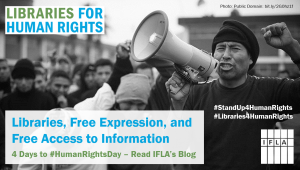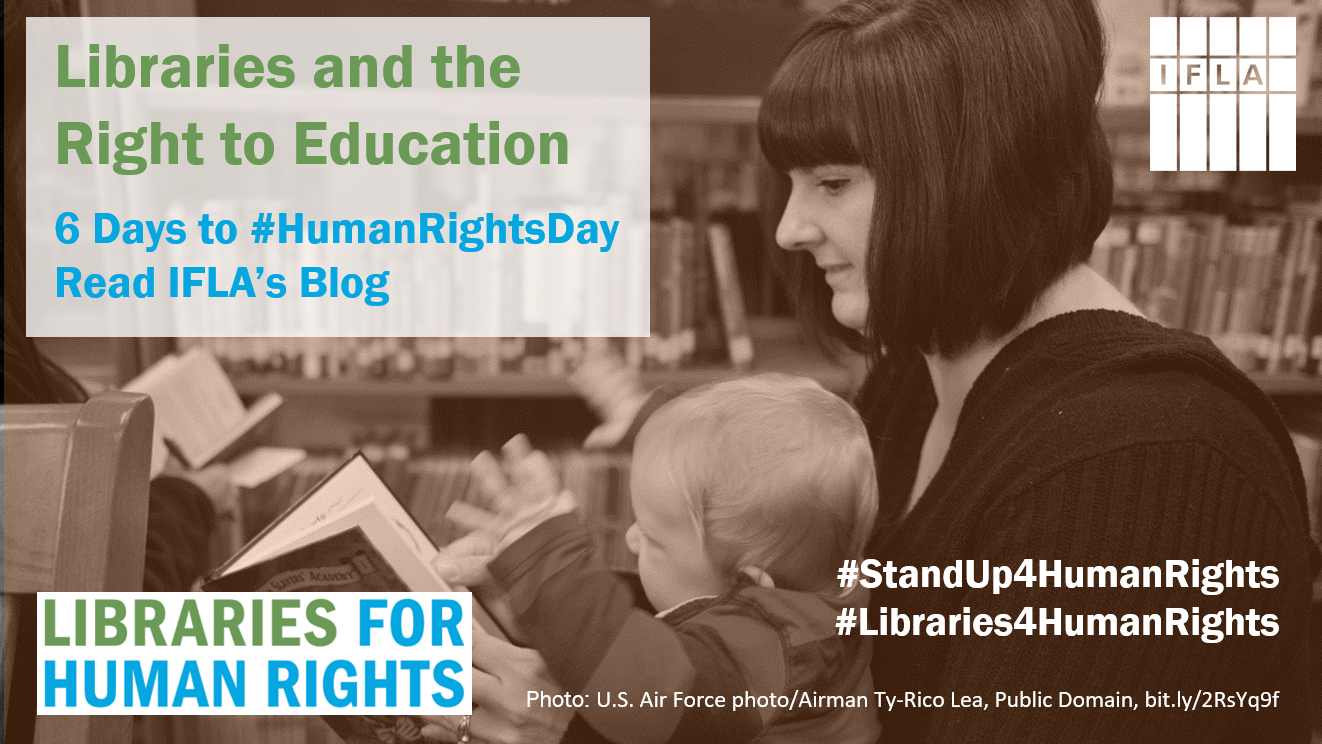 At two days to Human Rights Day 2018, the second-to-last of IFLA’s daily blogs looks at the right to participate in the cultural life of the community, or in short, the right to culture.
At two days to Human Rights Day 2018, the second-to-last of IFLA’s daily blogs looks at the right to participate in the cultural life of the community, or in short, the right to culture.
Amongst policy areas, culture is often seen as one of the least important. It rarely grabs the headlines in the same way as security, education or defence.
As such, it can seem like an easy area to cut when there is a need to make savings. Something that is nice, but not necessary.
Yet the Universal Declaration of Human Rights offers a strong counter-argument. Article 27 underlines that ‘Everyone has the right freely to participate in the cultural life of the community’.
This offers a confirmation of the central role of culture in the development of individuals and society, and the duty of governments to ensure that all can access it.
This is also an affirmation of one of the core roles of libraries, alongside promoting education and research. Our institutions provide a gateway to literature, from children’s books and bestsellers to the classics. They are key vehicles for delivering cultural policy – and human rights.
Yet as with the rest of the Universal Declaration, there is no obligation to deliver access to culture in any particular way. Is it more appropriate to focus efforts on those who cannot afford access in any other way, or should solutions be universal?
This blog looks at this question from the perspective of library services.
Levellers: Targeted Support to Enhance Access
Culture is not necessarily cheap. For people to be able to devote their time to writing, to theatre, or to other creative activities, they need – and deserve – support. Indeed, Article 27b of the Universal Declaration recognises this right to the material benefits of creativity.
Many others add value, through perfecting works, and then helping distribute them.
A variety of mechanisms are in place to support this activity, such as subsidies, benefits, or tax cuts. Yet selling works – books, films, plays, art – to consumers remains the key source of income in most cases.
For consumers who have a solid income already, this is clearly not a problem.
Yet this is not the case for everyone. In the case of young parents, for example, this can be crucial, as the cost of buying all the books a child will read can be high.
Libraries do indeed have a particularly important role in providing access to culture for people who may not otherwise be served by the market. This of course includes those who, in future, will earn more and buy more books.
Evidence from the United States indicates higher level of reliance on libraries by groups more likely to be marginalised. This suggests the potential of libraries as ‘levellers’ when it comes to access to culture.
A Universal Offer
While targeted support may be more cost-efficient in the immediate term, it implies differentiating between groups in society.
It is unfortunately the case that when a service is seen as something for the ‘poor’, people will start to avoid it out of pride. Some will be excluded, despite the need they face.
This is why the nature of libraries as a universal public service is so important. They are explicitly for everyone, not just specific groups.
And while they may have a particular duty to help people more at risk of exclusion from culture – such as those with low literacy or people with disabilities – this is not at the expense of their broader community role.
Libraries themselves work to build collections and services that respond to the needs of everyone.
And while this may mean that the possibility to borrow books is open to all, this can act as a powerful discovery tool, giving new authors an opportunity to meet new readers. Libraries, of course, also buy content, providing an important source of income to authors.
The universal focus of libraries also makes them more attractive as a meeting place for all members of the community. With few other public spaces for groups to come together, this can be a key driver of social cohesion.
The right of access to culture is perhaps one of the strongest bases for the existence – and activity of libraries.
In order to drive equity – equality of outcomes – they may need to make special efforts with some groups. But, crucially, it is their universal focus – to allow everyone to participate in cultural life – that can make libraries so effective.
Read also IFLA’s submission to the call for contributions on the tenth anniversary of the mandate of the UN Special Rapporteur on Cultural Rights.

